HIS 200: Analyzing History - Week 5/6 Short Response Assignment
VerifiedAdded on 2022/08/12
|10
|1814
|24
Homework Assignment
AI Summary
This assignment, a student's response to a HIS 200 homework, delves into the historical analysis of the Civil Rights Movement (1954-1968) and the Boston Busing Crisis. The student utilizes a historical lens of class and slavery to examine the impact of the Civil Rights Movement on voting rights, formulating a research question, identifying primary and secondary sources, and constructing a thesis statement. Key events like the Montgomery Bus Boycott, the March on Washington, and Freedom Rides are analyzed as contributory causes of the Voting Rights Act. The assignment also explores the consequences of the Act and the Boston Busing Crisis, including its causes and effects. The student analyzes primary sources using active reading strategies and provides evidence to support their assertions. The assignment reflects on the historical context, events, and their significance, providing insights into the complexities of these historical periods.
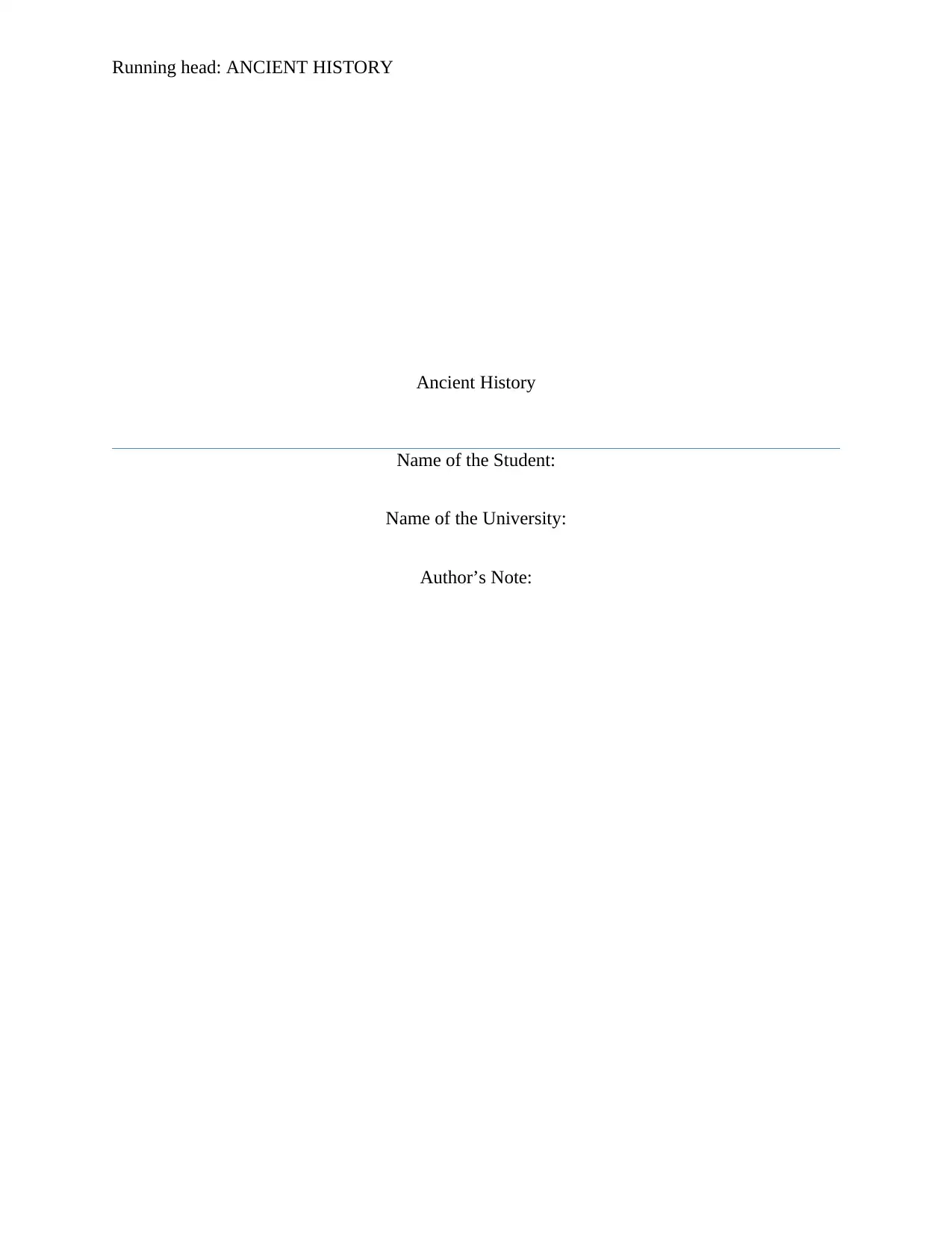
Running head: ANCIENT HISTORY
Ancient History
Name of the Student:
Name of the University:
Author’s Note:
Ancient History
Name of the Student:
Name of the University:
Author’s Note:
Paraphrase This Document
Need a fresh take? Get an instant paraphrase of this document with our AI Paraphraser
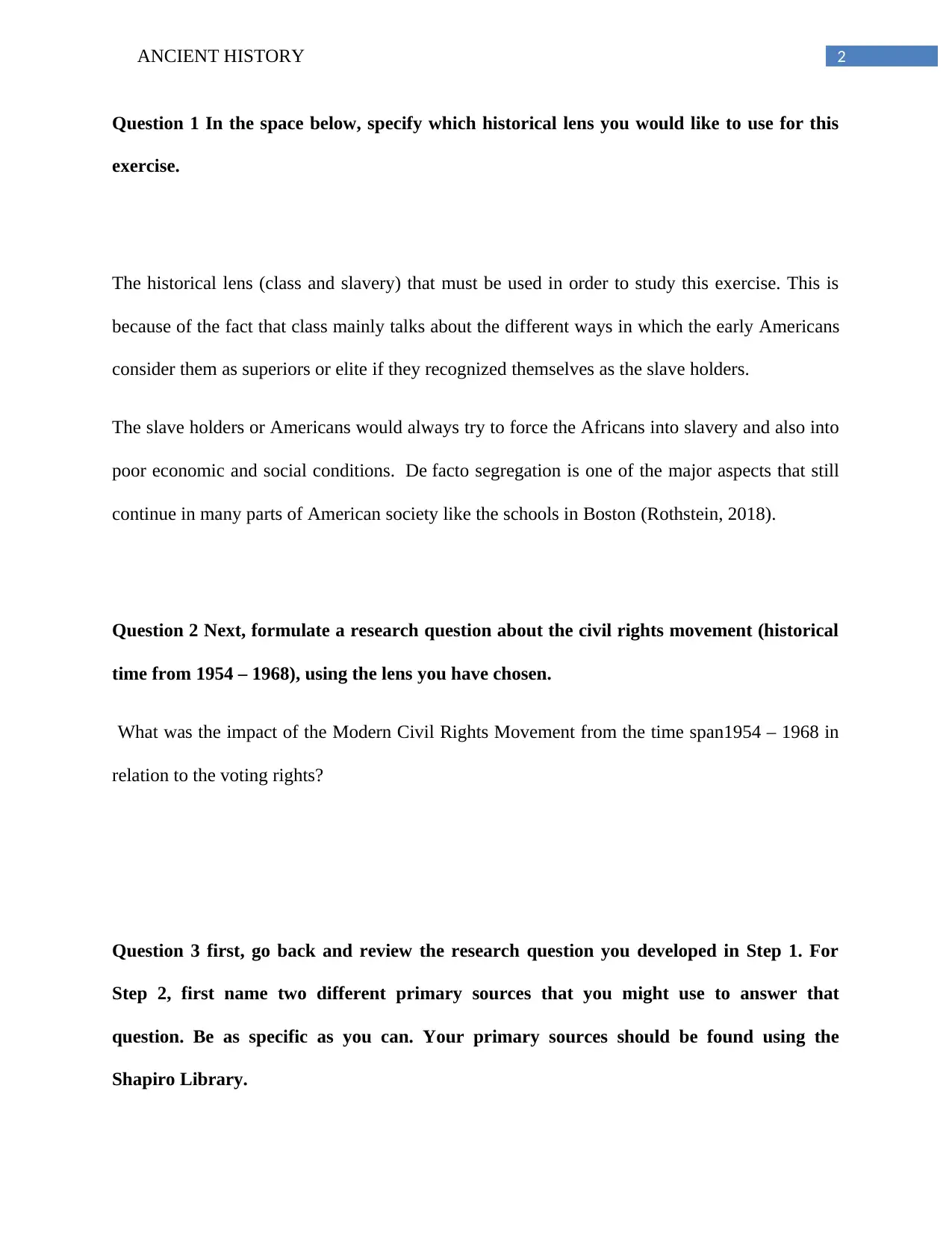
2ANCIENT HISTORY
Question 1 In the space below, specify which historical lens you would like to use for this
exercise.
The historical lens (class and slavery) that must be used in order to study this exercise. This is
because of the fact that class mainly talks about the different ways in which the early Americans
consider them as superiors or elite if they recognized themselves as the slave holders.
The slave holders or Americans would always try to force the Africans into slavery and also into
poor economic and social conditions. De facto segregation is one of the major aspects that still
continue in many parts of American society like the schools in Boston (Rothstein, 2018).
Question 2 Next, formulate a research question about the civil rights movement (historical
time from 1954 – 1968), using the lens you have chosen.
What was the impact of the Modern Civil Rights Movement from the time span1954 – 1968 in
relation to the voting rights?
Question 3 first, go back and review the research question you developed in Step 1. For
Step 2, first name two different primary sources that you might use to answer that
question. Be as specific as you can. Your primary sources should be found using the
Shapiro Library.
Question 1 In the space below, specify which historical lens you would like to use for this
exercise.
The historical lens (class and slavery) that must be used in order to study this exercise. This is
because of the fact that class mainly talks about the different ways in which the early Americans
consider them as superiors or elite if they recognized themselves as the slave holders.
The slave holders or Americans would always try to force the Africans into slavery and also into
poor economic and social conditions. De facto segregation is one of the major aspects that still
continue in many parts of American society like the schools in Boston (Rothstein, 2018).
Question 2 Next, formulate a research question about the civil rights movement (historical
time from 1954 – 1968), using the lens you have chosen.
What was the impact of the Modern Civil Rights Movement from the time span1954 – 1968 in
relation to the voting rights?
Question 3 first, go back and review the research question you developed in Step 1. For
Step 2, first name two different primary sources that you might use to answer that
question. Be as specific as you can. Your primary sources should be found using the
Shapiro Library.
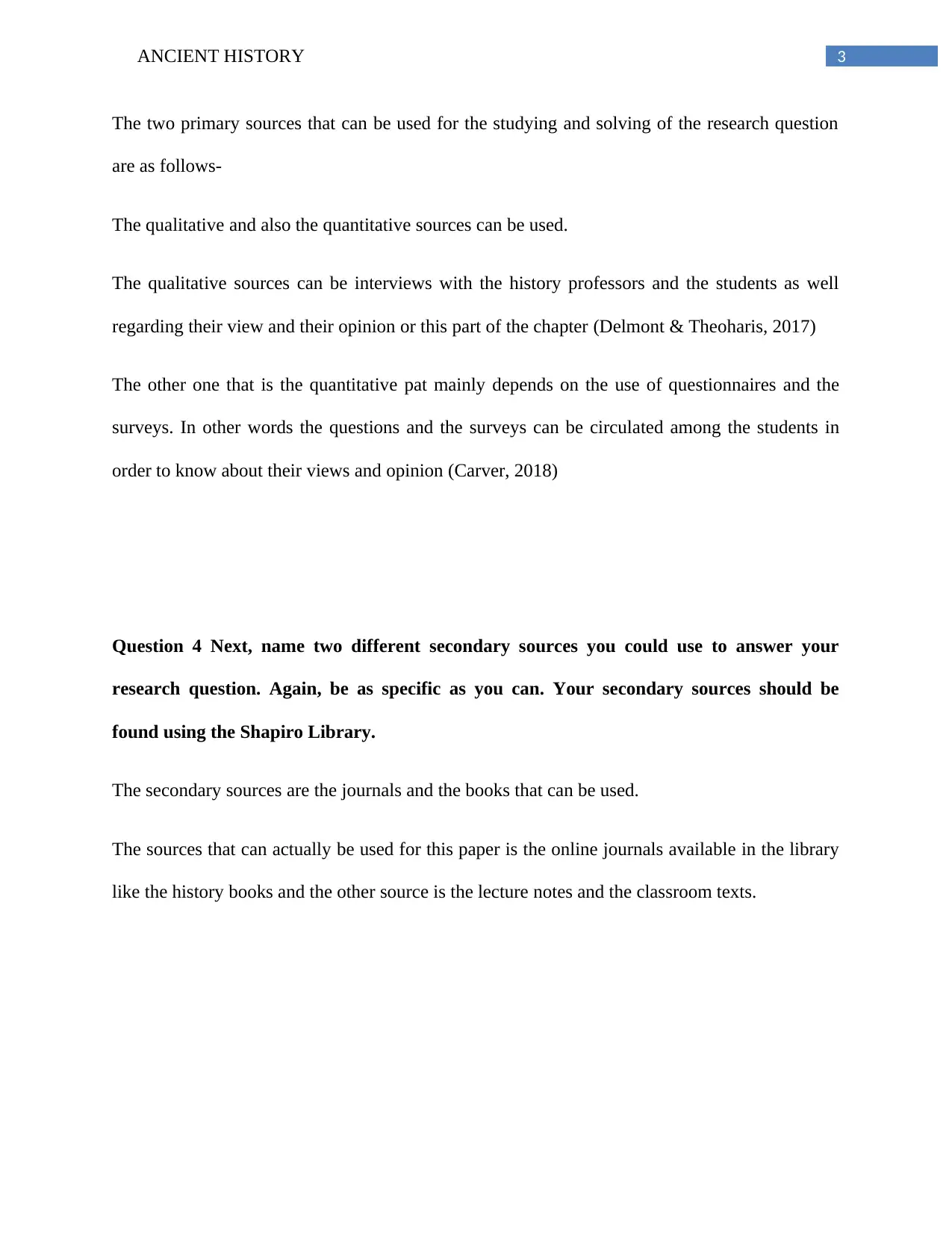
3ANCIENT HISTORY
The two primary sources that can be used for the studying and solving of the research question
are as follows-
The qualitative and also the quantitative sources can be used.
The qualitative sources can be interviews with the history professors and the students as well
regarding their view and their opinion or this part of the chapter (Delmont & Theoharis, 2017)
The other one that is the quantitative pat mainly depends on the use of questionnaires and the
surveys. In other words the questions and the surveys can be circulated among the students in
order to know about their views and opinion (Carver, 2018)
Question 4 Next, name two different secondary sources you could use to answer your
research question. Again, be as specific as you can. Your secondary sources should be
found using the Shapiro Library.
The secondary sources are the journals and the books that can be used.
The sources that can actually be used for this paper is the online journals available in the library
like the history books and the other source is the lecture notes and the classroom texts.
The two primary sources that can be used for the studying and solving of the research question
are as follows-
The qualitative and also the quantitative sources can be used.
The qualitative sources can be interviews with the history professors and the students as well
regarding their view and their opinion or this part of the chapter (Delmont & Theoharis, 2017)
The other one that is the quantitative pat mainly depends on the use of questionnaires and the
surveys. In other words the questions and the surveys can be circulated among the students in
order to know about their views and opinion (Carver, 2018)
Question 4 Next, name two different secondary sources you could use to answer your
research question. Again, be as specific as you can. Your secondary sources should be
found using the Shapiro Library.
The secondary sources are the journals and the books that can be used.
The sources that can actually be used for this paper is the online journals available in the library
like the history books and the other source is the lecture notes and the classroom texts.
⊘ This is a preview!⊘
Do you want full access?
Subscribe today to unlock all pages.

Trusted by 1+ million students worldwide
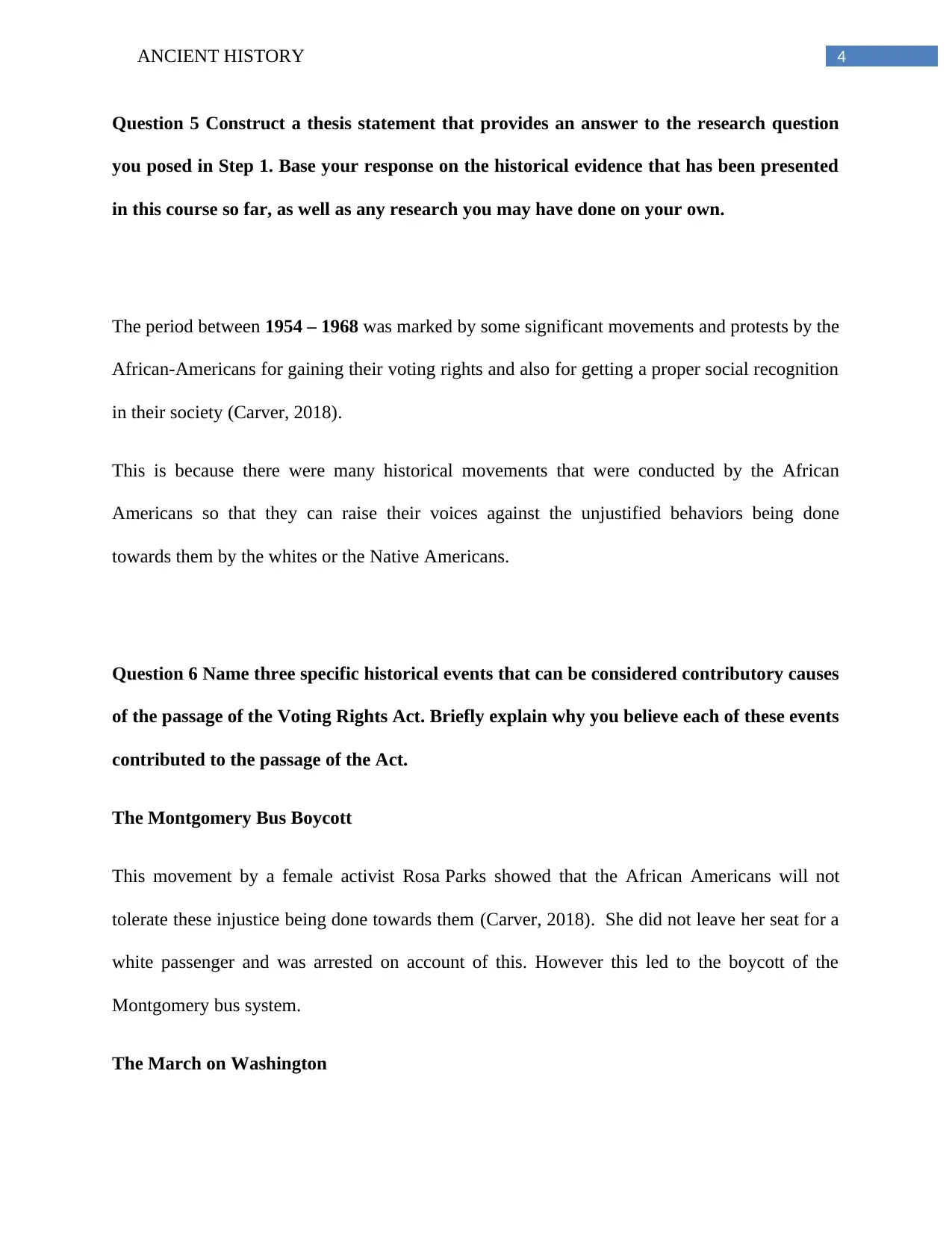
4ANCIENT HISTORY
Question 5 Construct a thesis statement that provides an answer to the research question
you posed in Step 1. Base your response on the historical evidence that has been presented
in this course so far, as well as any research you may have done on your own.
The period between 1954 – 1968 was marked by some significant movements and protests by the
African-Americans for gaining their voting rights and also for getting a proper social recognition
in their society (Carver, 2018).
This is because there were many historical movements that were conducted by the African
Americans so that they can raise their voices against the unjustified behaviors being done
towards them by the whites or the Native Americans.
Question 6 Name three specific historical events that can be considered contributory causes
of the passage of the Voting Rights Act. Briefly explain why you believe each of these events
contributed to the passage of the Act.
The Montgomery Bus Boycott
This movement by a female activist Rosa Parks showed that the African Americans will not
tolerate these injustice being done towards them (Carver, 2018). She did not leave her seat for a
white passenger and was arrested on account of this. However this led to the boycott of the
Montgomery bus system.
The March on Washington
Question 5 Construct a thesis statement that provides an answer to the research question
you posed in Step 1. Base your response on the historical evidence that has been presented
in this course so far, as well as any research you may have done on your own.
The period between 1954 – 1968 was marked by some significant movements and protests by the
African-Americans for gaining their voting rights and also for getting a proper social recognition
in their society (Carver, 2018).
This is because there were many historical movements that were conducted by the African
Americans so that they can raise their voices against the unjustified behaviors being done
towards them by the whites or the Native Americans.
Question 6 Name three specific historical events that can be considered contributory causes
of the passage of the Voting Rights Act. Briefly explain why you believe each of these events
contributed to the passage of the Act.
The Montgomery Bus Boycott
This movement by a female activist Rosa Parks showed that the African Americans will not
tolerate these injustice being done towards them (Carver, 2018). She did not leave her seat for a
white passenger and was arrested on account of this. However this led to the boycott of the
Montgomery bus system.
The March on Washington
Paraphrase This Document
Need a fresh take? Get an instant paraphrase of this document with our AI Paraphraser
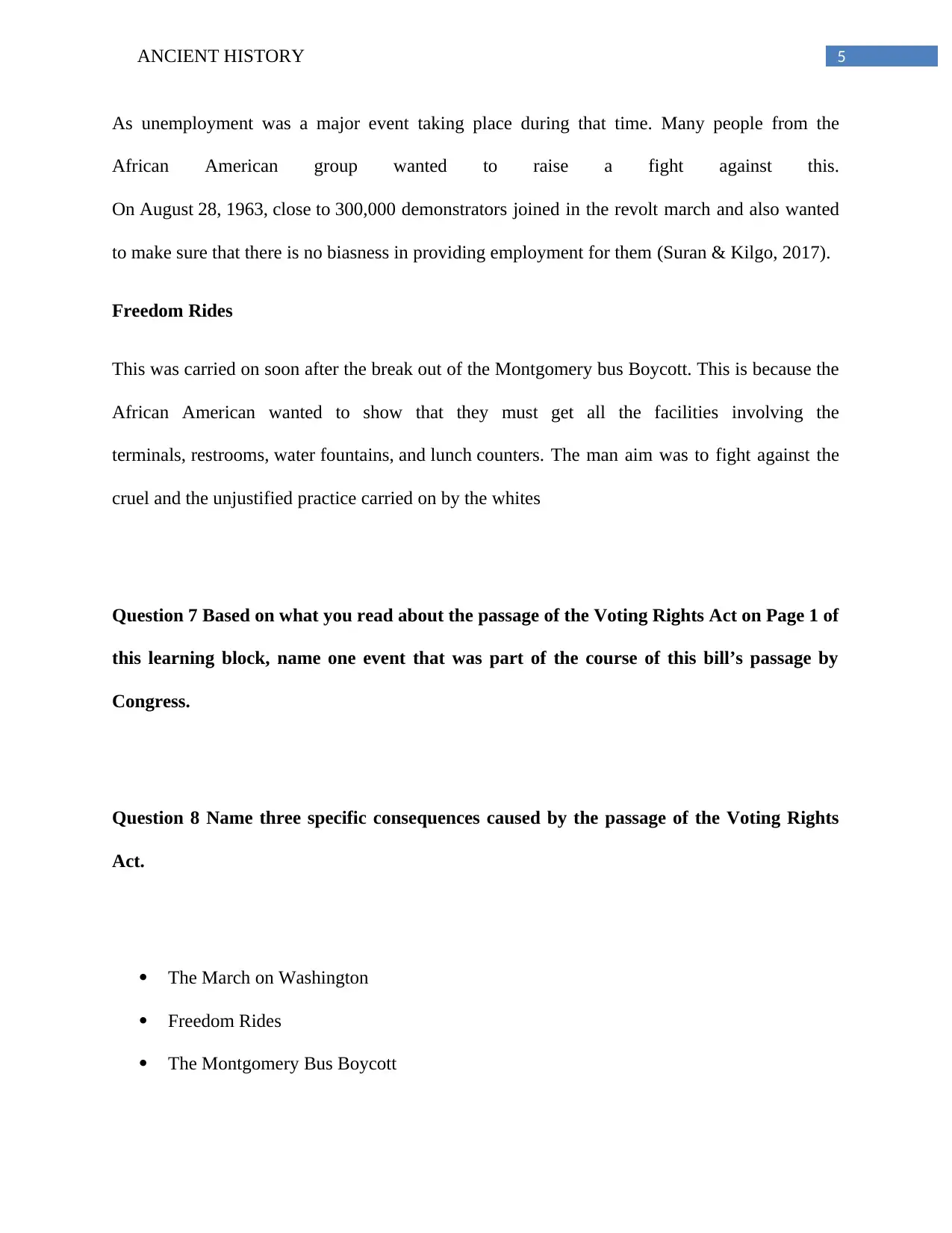
5ANCIENT HISTORY
As unemployment was a major event taking place during that time. Many people from the
African American group wanted to raise a fight against this.
On August 28, 1963, close to 300,000 demonstrators joined in the revolt march and also wanted
to make sure that there is no biasness in providing employment for them (Suran & Kilgo, 2017).
Freedom Rides
This was carried on soon after the break out of the Montgomery bus Boycott. This is because the
African American wanted to show that they must get all the facilities involving the
terminals, restrooms, water fountains, and lunch counters. The man aim was to fight against the
cruel and the unjustified practice carried on by the whites
Question 7 Based on what you read about the passage of the Voting Rights Act on Page 1 of
this learning block, name one event that was part of the course of this bill’s passage by
Congress.
Question 8 Name three specific consequences caused by the passage of the Voting Rights
Act.
The March on Washington
Freedom Rides
The Montgomery Bus Boycott
As unemployment was a major event taking place during that time. Many people from the
African American group wanted to raise a fight against this.
On August 28, 1963, close to 300,000 demonstrators joined in the revolt march and also wanted
to make sure that there is no biasness in providing employment for them (Suran & Kilgo, 2017).
Freedom Rides
This was carried on soon after the break out of the Montgomery bus Boycott. This is because the
African American wanted to show that they must get all the facilities involving the
terminals, restrooms, water fountains, and lunch counters. The man aim was to fight against the
cruel and the unjustified practice carried on by the whites
Question 7 Based on what you read about the passage of the Voting Rights Act on Page 1 of
this learning block, name one event that was part of the course of this bill’s passage by
Congress.
Question 8 Name three specific consequences caused by the passage of the Voting Rights
Act.
The March on Washington
Freedom Rides
The Montgomery Bus Boycott
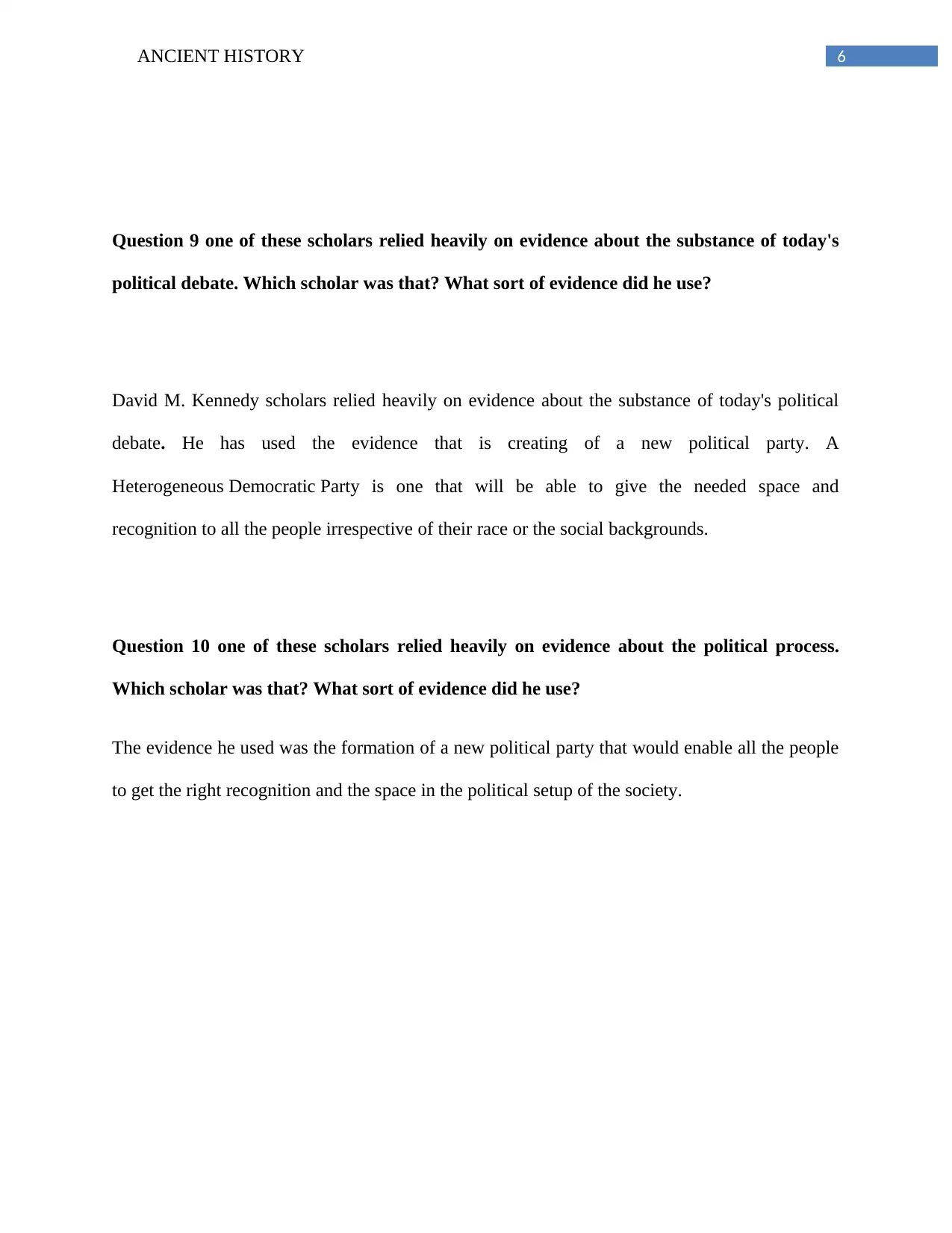
6ANCIENT HISTORY
Question 9 one of these scholars relied heavily on evidence about the substance of today's
political debate. Which scholar was that? What sort of evidence did he use?
David M. Kennedy scholars relied heavily on evidence about the substance of today's political
debate. He has used the evidence that is creating of a new political party. A
Heterogeneous Democratic Party is one that will be able to give the needed space and
recognition to all the people irrespective of their race or the social backgrounds.
Question 10 one of these scholars relied heavily on evidence about the political process.
Which scholar was that? What sort of evidence did he use?
The evidence he used was the formation of a new political party that would enable all the people
to get the right recognition and the space in the political setup of the society.
Question 9 one of these scholars relied heavily on evidence about the substance of today's
political debate. Which scholar was that? What sort of evidence did he use?
David M. Kennedy scholars relied heavily on evidence about the substance of today's political
debate. He has used the evidence that is creating of a new political party. A
Heterogeneous Democratic Party is one that will be able to give the needed space and
recognition to all the people irrespective of their race or the social backgrounds.
Question 10 one of these scholars relied heavily on evidence about the political process.
Which scholar was that? What sort of evidence did he use?
The evidence he used was the formation of a new political party that would enable all the people
to get the right recognition and the space in the political setup of the society.
⊘ This is a preview!⊘
Do you want full access?
Subscribe today to unlock all pages.

Trusted by 1+ million students worldwide
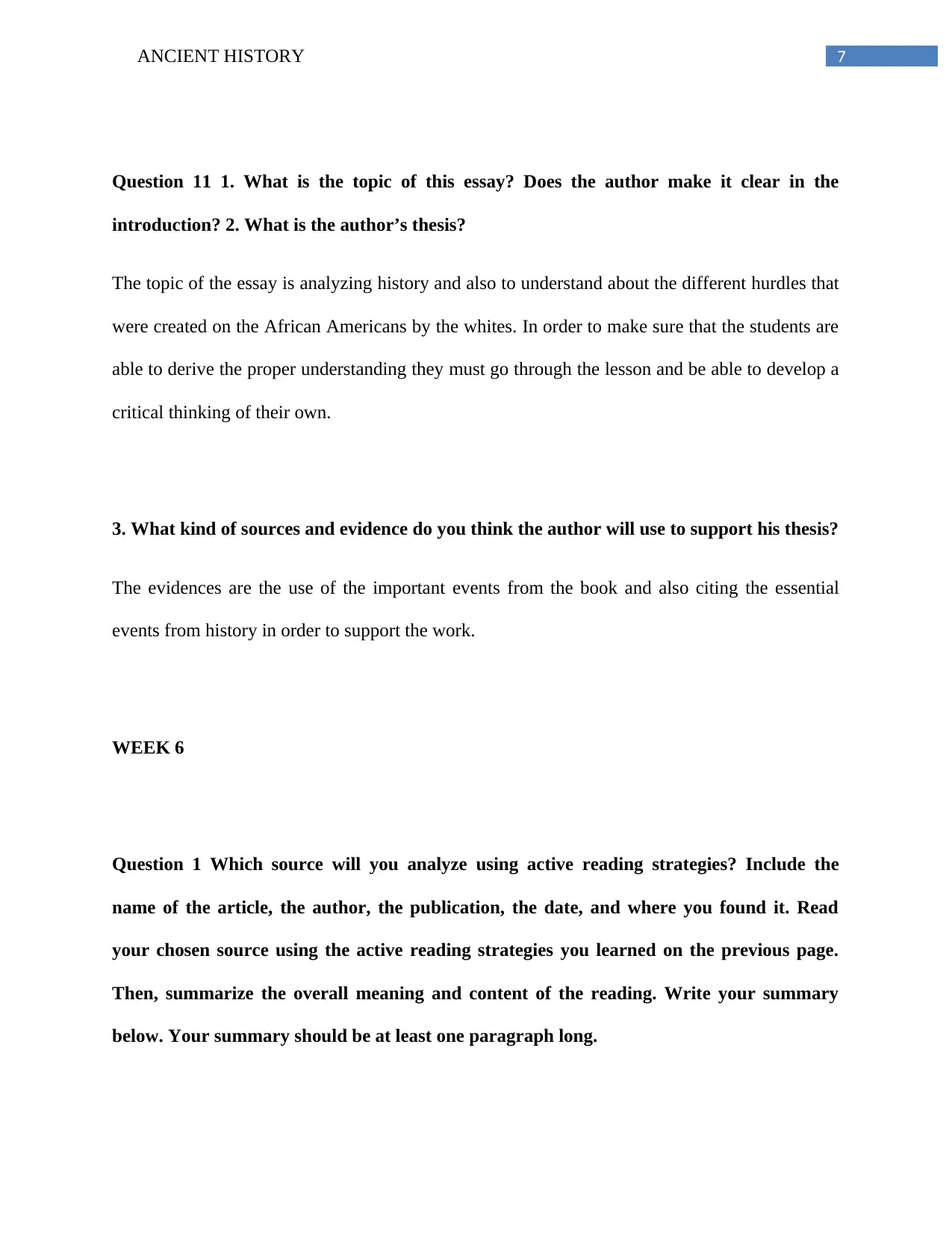
7ANCIENT HISTORY
Question 11 1. What is the topic of this essay? Does the author make it clear in the
introduction? 2. What is the author’s thesis?
The topic of the essay is analyzing history and also to understand about the different hurdles that
were created on the African Americans by the whites. In order to make sure that the students are
able to derive the proper understanding they must go through the lesson and be able to develop a
critical thinking of their own.
3. What kind of sources and evidence do you think the author will use to support his thesis?
The evidences are the use of the important events from the book and also citing the essential
events from history in order to support the work.
WEEK 6
Question 1 Which source will you analyze using active reading strategies? Include the
name of the article, the author, the publication, the date, and where you found it. Read
your chosen source using the active reading strategies you learned on the previous page.
Then, summarize the overall meaning and content of the reading. Write your summary
below. Your summary should be at least one paragraph long.
Question 11 1. What is the topic of this essay? Does the author make it clear in the
introduction? 2. What is the author’s thesis?
The topic of the essay is analyzing history and also to understand about the different hurdles that
were created on the African Americans by the whites. In order to make sure that the students are
able to derive the proper understanding they must go through the lesson and be able to develop a
critical thinking of their own.
3. What kind of sources and evidence do you think the author will use to support his thesis?
The evidences are the use of the important events from the book and also citing the essential
events from history in order to support the work.
WEEK 6
Question 1 Which source will you analyze using active reading strategies? Include the
name of the article, the author, the publication, the date, and where you found it. Read
your chosen source using the active reading strategies you learned on the previous page.
Then, summarize the overall meaning and content of the reading. Write your summary
below. Your summary should be at least one paragraph long.
Paraphrase This Document
Need a fresh take? Get an instant paraphrase of this document with our AI Paraphraser
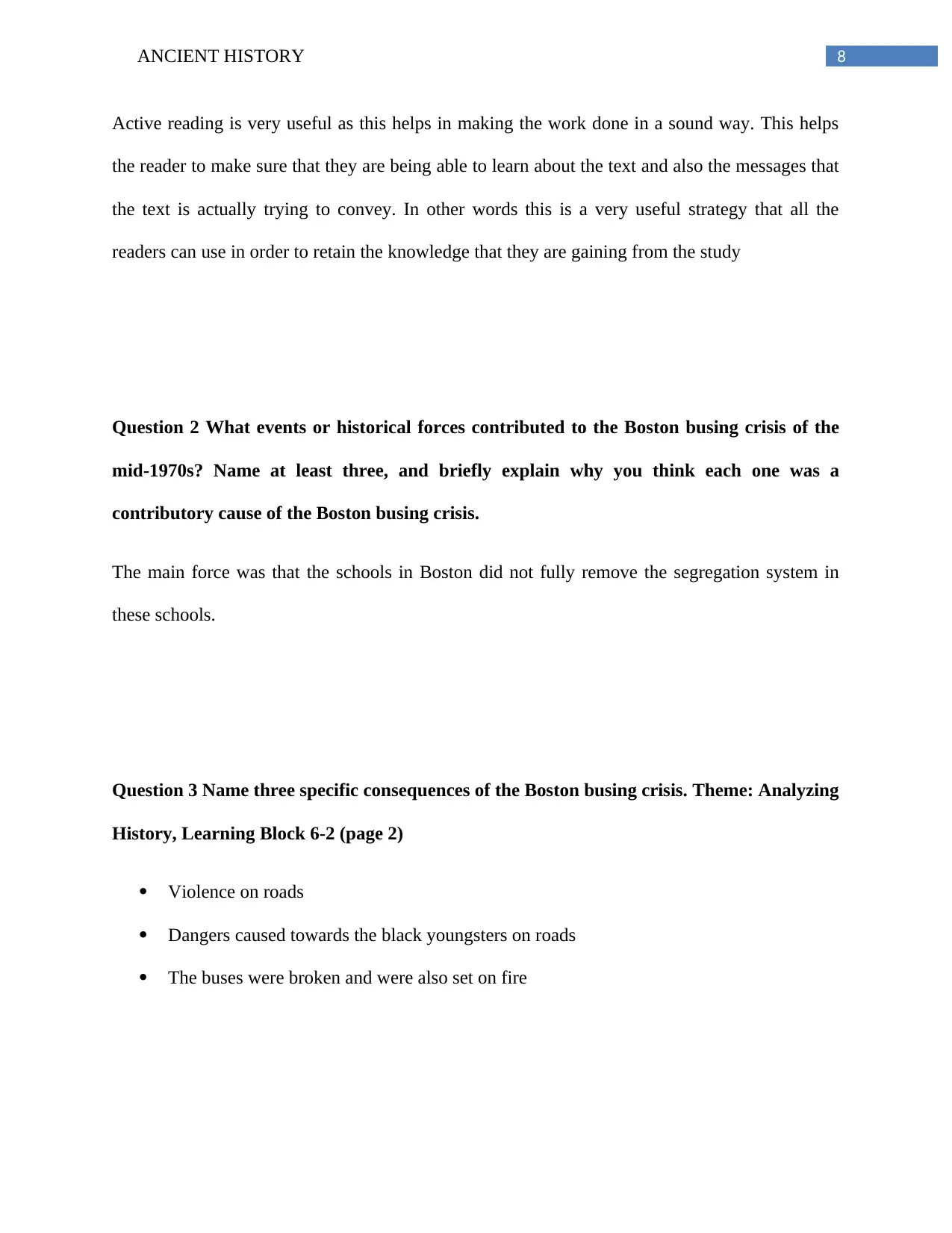
8ANCIENT HISTORY
Active reading is very useful as this helps in making the work done in a sound way. This helps
the reader to make sure that they are being able to learn about the text and also the messages that
the text is actually trying to convey. In other words this is a very useful strategy that all the
readers can use in order to retain the knowledge that they are gaining from the study
Question 2 What events or historical forces contributed to the Boston busing crisis of the
mid-1970s? Name at least three, and briefly explain why you think each one was a
contributory cause of the Boston busing crisis.
The main force was that the schools in Boston did not fully remove the segregation system in
these schools.
Question 3 Name three specific consequences of the Boston busing crisis. Theme: Analyzing
History, Learning Block 6-2 (page 2)
Violence on roads
Dangers caused towards the black youngsters on roads
The buses were broken and were also set on fire
Active reading is very useful as this helps in making the work done in a sound way. This helps
the reader to make sure that they are being able to learn about the text and also the messages that
the text is actually trying to convey. In other words this is a very useful strategy that all the
readers can use in order to retain the knowledge that they are gaining from the study
Question 2 What events or historical forces contributed to the Boston busing crisis of the
mid-1970s? Name at least three, and briefly explain why you think each one was a
contributory cause of the Boston busing crisis.
The main force was that the schools in Boston did not fully remove the segregation system in
these schools.
Question 3 Name three specific consequences of the Boston busing crisis. Theme: Analyzing
History, Learning Block 6-2 (page 2)
Violence on roads
Dangers caused towards the black youngsters on roads
The buses were broken and were also set on fire
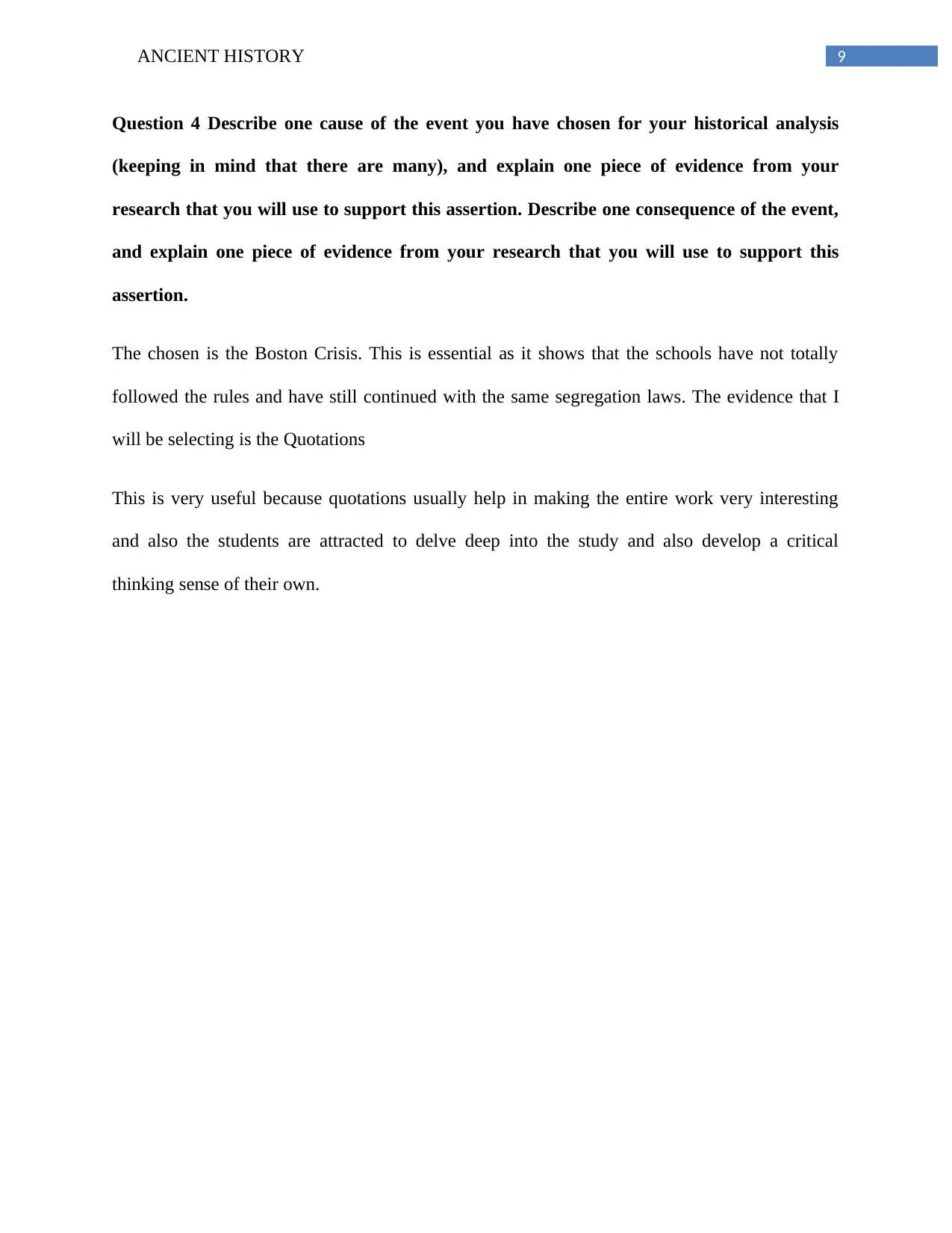
9ANCIENT HISTORY
Question 4 Describe one cause of the event you have chosen for your historical analysis
(keeping in mind that there are many), and explain one piece of evidence from your
research that you will use to support this assertion. Describe one consequence of the event,
and explain one piece of evidence from your research that you will use to support this
assertion.
The chosen is the Boston Crisis. This is essential as it shows that the schools have not totally
followed the rules and have still continued with the same segregation laws. The evidence that I
will be selecting is the Quotations
This is very useful because quotations usually help in making the entire work very interesting
and also the students are attracted to delve deep into the study and also develop a critical
thinking sense of their own.
Question 4 Describe one cause of the event you have chosen for your historical analysis
(keeping in mind that there are many), and explain one piece of evidence from your
research that you will use to support this assertion. Describe one consequence of the event,
and explain one piece of evidence from your research that you will use to support this
assertion.
The chosen is the Boston Crisis. This is essential as it shows that the schools have not totally
followed the rules and have still continued with the same segregation laws. The evidence that I
will be selecting is the Quotations
This is very useful because quotations usually help in making the entire work very interesting
and also the students are attracted to delve deep into the study and also develop a critical
thinking sense of their own.
⊘ This is a preview!⊘
Do you want full access?
Subscribe today to unlock all pages.

Trusted by 1+ million students worldwide
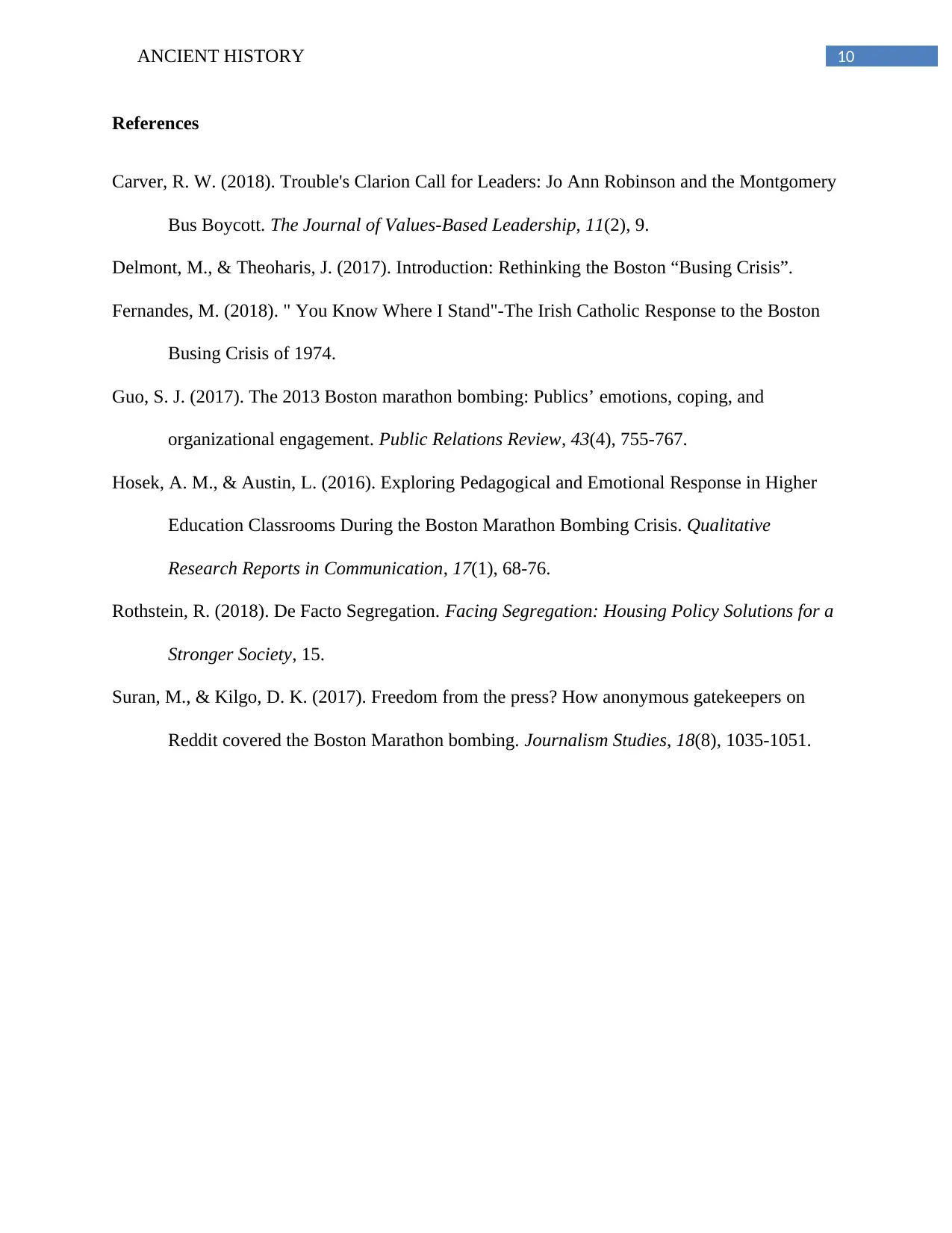
10ANCIENT HISTORY
References
Carver, R. W. (2018). Trouble's Clarion Call for Leaders: Jo Ann Robinson and the Montgomery
Bus Boycott. The Journal of Values-Based Leadership, 11(2), 9.
Delmont, M., & Theoharis, J. (2017). Introduction: Rethinking the Boston “Busing Crisis”.
Fernandes, M. (2018). " You Know Where I Stand"-The Irish Catholic Response to the Boston
Busing Crisis of 1974.
Guo, S. J. (2017). The 2013 Boston marathon bombing: Publics’ emotions, coping, and
organizational engagement. Public Relations Review, 43(4), 755-767.
Hosek, A. M., & Austin, L. (2016). Exploring Pedagogical and Emotional Response in Higher
Education Classrooms During the Boston Marathon Bombing Crisis. Qualitative
Research Reports in Communication, 17(1), 68-76.
Rothstein, R. (2018). De Facto Segregation. Facing Segregation: Housing Policy Solutions for a
Stronger Society, 15.
Suran, M., & Kilgo, D. K. (2017). Freedom from the press? How anonymous gatekeepers on
Reddit covered the Boston Marathon bombing. Journalism Studies, 18(8), 1035-1051.
References
Carver, R. W. (2018). Trouble's Clarion Call for Leaders: Jo Ann Robinson and the Montgomery
Bus Boycott. The Journal of Values-Based Leadership, 11(2), 9.
Delmont, M., & Theoharis, J. (2017). Introduction: Rethinking the Boston “Busing Crisis”.
Fernandes, M. (2018). " You Know Where I Stand"-The Irish Catholic Response to the Boston
Busing Crisis of 1974.
Guo, S. J. (2017). The 2013 Boston marathon bombing: Publics’ emotions, coping, and
organizational engagement. Public Relations Review, 43(4), 755-767.
Hosek, A. M., & Austin, L. (2016). Exploring Pedagogical and Emotional Response in Higher
Education Classrooms During the Boston Marathon Bombing Crisis. Qualitative
Research Reports in Communication, 17(1), 68-76.
Rothstein, R. (2018). De Facto Segregation. Facing Segregation: Housing Policy Solutions for a
Stronger Society, 15.
Suran, M., & Kilgo, D. K. (2017). Freedom from the press? How anonymous gatekeepers on
Reddit covered the Boston Marathon bombing. Journalism Studies, 18(8), 1035-1051.
1 out of 10
Your All-in-One AI-Powered Toolkit for Academic Success.
+13062052269
info@desklib.com
Available 24*7 on WhatsApp / Email
![[object Object]](/_next/static/media/star-bottom.7253800d.svg)
Unlock your academic potential
Copyright © 2020–2026 A2Z Services. All Rights Reserved. Developed and managed by ZUCOL.
